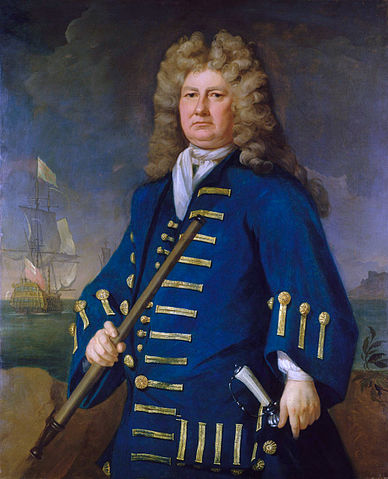In the most recent Age of Invention newsletter, Anton Howes does a bit of heavy lifting to debunk some accreted nonsense about the origins and success of early innovation prizes:

Admiral of the Fleet Sir Cloudsley Shovell (1650-1707).
Portrait by unknown artist from the National Maritime Museum collection via Wikimedia Commons.
Yesterday I had a piece in Works in Progress magazine, on the best ways to design modern innovation prizes — and why many of them fail.
I examined the famous “Longitude Prize” of 1714, and in the process busted some major myths about it. Almost every element of the popular story is wrong — something that experts on the topic like Richard Dunn and Rebekah Higgitt have been going on about for years. The popular story’s hero, John Harrison, often portrayed as an inventor shunned by a haughty scientific establishment, actually received massive amounts of funding from the committee for awarding the prize. The story’s villain, the Astronomer Royal Neville Maskelyne, was no villain at all. And there’s very little evidence that the prize actually incentivised people to innovate. The Board of Longitude, for that matter, ended up more like a grant-giving agency — a kind of navigation-themed DARPA — than just a committee of prize judges.
You can read the full piece here.
So what is the rest of this week’s newsletter about? Well, I’d like to take the chance to bust even more myths about innovation prizes!
Let’s start with a fairly small one, to do with longitude, that I’d missed. Take the narrative about the 1707 naval disaster off the Isles of Scilly, which led to the demise of the wonderfully-named admiral Sir Cloudesley Shovell. The disaster is usually cited as having been the direct cause of the institution of the 1714 reward, and, of course, gives most Youtubers, bloggers, and TV presenters discussing longitude the opportunity to say the name “Sir Cloudesley Shovell”. Who wouldn’t?
I had already been sceptical of the disaster’s relevance to Parliament’s creation of the longitude reward, because of the seven-year delay. I had then noticed, when researching for the piece, that the disaster was hardly mentioned at all by those lobbying for the reward, by those consulted on it, or by the MPs who voted on it. It seemed to be irrelevant as a cause, so I repurposed that part of the popular story to simply use as a general example of a naval disaster caused by not knowing one’s position at sea.
But even my downgrading of its relevance, it turns out, may have been over-generous. Yesterday, after I published my piece, Richard Dunn pointed out to me that not only was the 1707 disaster irrelevant as a cause of the 1714 reward, but that the disaster itself may not have had very much to do with a specific failure to find longitude. It certainly wasn’t singled out as a cause at the time.
As for the actual causes, they were probably compass error, inconsistent charts, and even uncertainty over the fleet’s latitude, not just its longitude. And to the extent that not knowing the fleet’s longitude appears to have been a major part of the problem, it was also related to failures to accurately calculate longitude on land — something that could already be done using existing techniques. The navigational text-books, for example, disagreed on the position of Cape Spartel, in Morocco, from which the fleet departed and took its bearings. As the maritime historian William E. May put it, when he looked into the detail of the fleet’s route and navigational measurements, “the errors in longitudes in the accepted text-books must have introduced a danger just as great as any errors in reckoning the longitude.”



